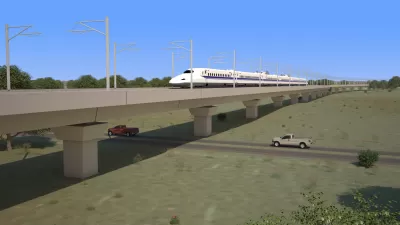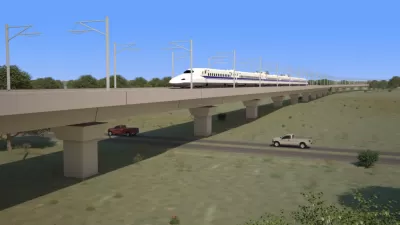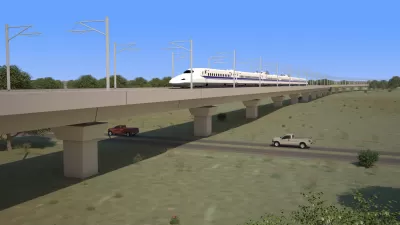Texas Central has its construction contracts and a court decision in its favor, but significant obstacles remain for the high-speed rail project connecting Houston and Dallas to get underway.

"Privately funded high-speed rail developer Texas Central has signed a $16 billion 'final agreement' with Italian firm Webuild Group and its U.S. subsidiary Lane Construction Corp. to build its 236-mile line connecting Dallas and Houston," reports Marybeth Luczak. The announcement comes with a large caveat, however: the project has yet to secure funding to pay the new contractors.
Luczak details some of the difficulties in reporting on the project, saying Texas Central and its media relations contractors have not been willing to provide much specific detail on proect financing. Available information about project financing has not been updated since fall of 2020, according to Luczak, despite recent inquiries.
Texas Central media representatives were willing to estimate the launch of construction in late 2021 or late 2022.
According to the article, Webuild is planning to replicate performance metric established by the Japanese Tokaido Shinkansen system, operated by Central Japan Railway Co., with train speeds of up to 200 mph.
"The system is planned to link Dallas and Houston, with an intermediate station west of Roans Prairie in Grimes County and near Texas A&M University, on a dedicated right-of-way. Travel time is being advertised at less than 90 minutes. Webuild estimates that approximately 6 million riders will use the train by 2029 and 13 million by 2050," according to Luczak.
In other news related to the project, the Texas Supreme Court declined a case that attempted to block Texas central from using eminent domain to acquire right of way for the project. Kim Roberts reports on the demise of the case made by homeowners against the project in an article for The Texan.
FULL STORY: Texas Central: Contractor Secured. Funding?

Planetizen Federal Action Tracker
A weekly monitor of how Trump’s orders and actions are impacting planners and planning in America.

Chicago’s Ghost Rails
Just beneath the surface of the modern city lie the remnants of its expansive early 20th-century streetcar system.

San Antonio and Austin are Fusing Into one Massive Megaregion
The region spanning the two central Texas cities is growing fast, posing challenges for local infrastructure and water supplies.

Since Zion's Shuttles Went Electric “The Smog is Gone”
Visitors to Zion National Park can enjoy the canyon via the nation’s first fully electric park shuttle system.

Trump Distributing DOT Safety Funds at 1/10 Rate of Biden
Funds for Safe Streets and other transportation safety and equity programs are being held up by administrative reviews and conflicts with the Trump administration’s priorities.

German Cities Subsidize Taxis for Women Amid Wave of Violence
Free or low-cost taxi rides can help women navigate cities more safely, but critics say the programs don't address the root causes of violence against women.
Urban Design for Planners 1: Software Tools
This six-course series explores essential urban design concepts using open source software and equips planners with the tools they need to participate fully in the urban design process.
Planning for Universal Design
Learn the tools for implementing Universal Design in planning regulations.
planning NEXT
Appalachian Highlands Housing Partners
Mpact (founded as Rail~Volution)
City of Camden Redevelopment Agency
City of Astoria
City of Portland
City of Laramie





























